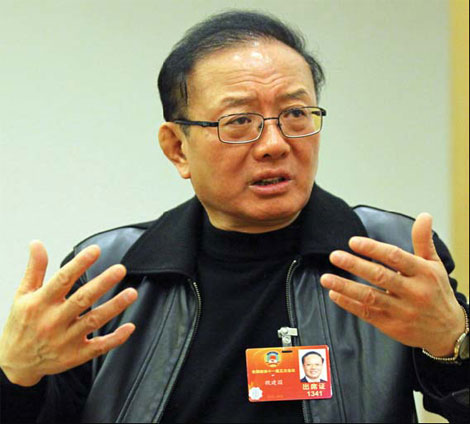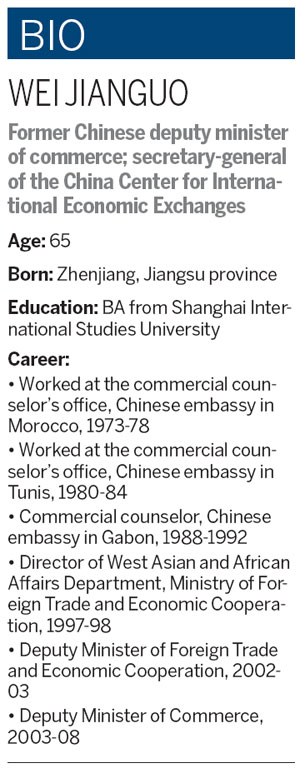Friend of Africa in deed
Updated: 2012-04-13 07:44
By Liu Lu (China Daily)
|
||||||||
|
Wei Jianguo, former deputy commerce minister, believes there is immense potential for Sino-Africa economic, trade cooperation. [Zou Hong / China Daily] |
Few Chinese know the continent the way Wei Jianguo does
Wei Jianguo has had a string of titles during a long and distinguished career, but perhaps the tag that most suits him is "friend of Africa".
In 40 years of service, his most significant work has been in facilitating Sino-African economic and trade exchanges.
Wei, China's former deputy minister of commerce and current secretary-general of the think tank China Center for International Economic Exchanges, is committed to promoting China-Africa trade cooperation.
"I've been doing one single thing all my life: working with African countries and its people," Wei says.
Wei, 65, who hails from Jiangsu province, has left his footprints in almost all African countries and "forged a profound affinity" with the second-largest continent.
"My yellow skin bears the mark of the hot African sun," Wei jokes.
Wei's strong ties with Africa and his affection for it come across in the animated way he talks and in the rich assortment of colorful expressions he uses.
Looking back, Wei says this unbreakable bond is something he never expected. "My childhood dream was to become a military engineer, but fate has connected me with Africa."
When he was waiting to be admitted to a military college, he was offered the chance to become one of only four students in Jiangsu to study French abroad as a diplomat candidate, he says. The project was fully funded by the government.
After a lot of thought, he decided to seize the opportunity.
"My decision changed my career path and shaped me, but I have no regrets at all because it opened the door to an unknown world that seemed to be a huge adventure."
After graduating in 1972, Wei was placed in the Ministry of Foreign Trade and Economic Cooperation, now known as the Ministry of Commerce. A year later he began to travel around Africa and lived in Morocco, Tunisia and Gabon for about 20 years as commercial specialist and counselor.
"My stay in Africa gave me first-hand knowledge of Sino-Africa trade, allowing me to do something practical to promote trade between the two regions."
|
|
He recalls one incident in Casablanca in 1973, his second year of service, working at the Chinese embassy in Morocco, that gave him the resolve to expand China-Africa trade.
"I was shocked to learn that the price of a whole shipment of Chinese green tea equaled just one Japanese car. The price gaps between Chinese and Japanese goods were as great as the Great Rift Valley."
Wei then realized that China needed to boost exports of high-tech and high value-added products to Africa.
Since then he and his colleagues have done all they can to ensure that Chinese companies are kept up to date on trade trends. That hard work gradually paid off as trade between China and Morocco took off.
"China-made ceiling fans became sought-after goods in the local market," Wei says.
When he talks of such things, his brimming enthusiasm and passion spills out. "The most encouraging thing in my 40 years of service was to see Sino-Africa economic and trade cooperation develop by leaps and bounds."
Ministry of Commerce statistics show that the value of China-Africa trade had increased from just $1 billion (0.77 billion euros) a year in 1980 to $126.9 billion in 2010, and China replaced the US to become Africa's largest trading partner three years ago.
The value of trade between the two sides will reach $300 billion in three to five years, Wei predicts. "There is immense potential for China-Africa trade."
But China's relationship with Africa is about much more than trade, and Wei has been privileged to watch the friendship between the two grow.
"We have offered sincere economic assistance within our own capacity to African countries without any political conditions, and that aid is in line with the needs of Africa and its people.
"We are helping African countries build capacity for self-development by training local people and sharing technologies with them, and encouraging Chinese enterprises to invest in Africa to increase employment, all of which local people welcome.
"African people feel that China's aid to them is sincere, and many of them look on us as 'Chinese brothers'."
Although Wei has retired from the post of deputy-minister of commerce, his heart clearly remains tethered to Africa.
He is keen to encourage more Chinese enterprises, particularly the small- and medium-sized ones, to explore the huge business potential in Africa, because he believes now is the right time.
As a result of the worldwide financial crisis that erupted in late 2008, many investors pulled their money out of Europe and the US, he says.
In contrast, Africa, a largely untapped market, is rising to become a new magnet for foreign investment, as signs have emerged of the continent's economy rapidly picking up over the past 10 years.
"Compared with the gloomy outlook in the two traditional investment hot spots (Europe and the US), Africa holds better prospects for countries like China with abundant foreign exchange reserves and capital to tap its vast market," Wei says.
Africa is also looking to attract more quality investment from Chinese, he says.
"Instead of green notes (US dollars) and blue notes (euros), Africans are now going for red notes (Chinese yuan)," Wei says, "because China and Africa are becoming increasingly complementary in economic development, and Africa sees China as a reliable partner."
To offer Chinese businesses a well-rounded investment guideline in Africa, Wei offers an in-depth look at his nearly four decades of work in facilitating trade with Africa in his recent memoir, A Lifetime of Memories in Africa: My Experiences and Understanding of Africa.
The hefty tome of nearly 500,000 words details the history of Sino-Africa relations and the formation of China's trade policies that Wei witnessed and experienced, and features 167 photos that capture many key moments in the Sino-African relationship.
The author's sentimental attachment to Africa comes across throughout the book.
The book, published in English and French, is going to be promoted at the London Book Fair being held from April 16 to 18. The book was published in Chinese in October.
"I hope the book not only opens a gateway for Chinese investors who want to start up business in Africa, but also gives a new perspective to international readers to reduce misunderstandings and stereotypes of Africa and helps people to better know this fascinating land," Wei says.
liulu@chinadaily.com.cn

 Relief reaches isolated village
Relief reaches isolated village
 Rainfall poses new threats to quake-hit region
Rainfall poses new threats to quake-hit region
 Funerals begin for Boston bombing victims
Funerals begin for Boston bombing victims
 Quake takeaway from China's Air Force
Quake takeaway from China's Air Force
 Obama celebrates young inventors at science fair
Obama celebrates young inventors at science fair
 Earth Day marked around the world
Earth Day marked around the world
 Volunteer team helping students find sense of normalcy
Volunteer team helping students find sense of normalcy
 Ethnic groups quick to join rescue efforts
Ethnic groups quick to join rescue efforts
Most Viewed
Editor's Picks

|

|

|

|

|

|
Today's Top News
Chinese fleet drives out Japan's boats from Diaoyu
Health new priority for quake zone
Inspired by Guan, more Chinese pick up golf
Russia criticizes US reports on human rights
China, ROK criticize visits to shrine
Sino-US shared interests emphasized
China 'aims to share its dream with world'
Chinese president appoints 5 new ambassadors
US Weekly

|

|








